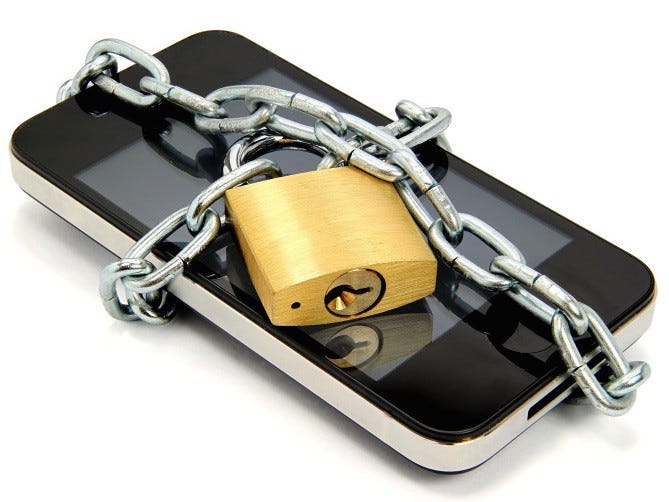Can Locking Up Our Phones at Concerts Really Save Us from Ourselves?
Riffs on prying the audience’s attention away from their precious glowing miracle slabs

Riffs on prying the audience’s attention away from their precious glowing miracle slabs
Sometimes in an interview, when you’re doing your best to ask (or answer) the weighty questions, there comes a moment of sudden unexpected profundity. That’s what seems to have happened in the discussion between Washington Post reporter Geoff Edgars and Yondr founder and CEO Graham Dugoni, whose company makes lockable mobile phone pouches used by Alicia Keys and other headliners at live events.
The 29-year-old entrepreneur rattles off the advantages artists see with the pouch, which include the obvious: The performance does not get leaked on the Internet. Then he turns to a perhaps under-appreciated benefit for the audience: “If you haven’t been to a phone-free show, you just don’t know what you’re missing,” Dugoni says. “There’s something about living in real life that can’t be replicated.”
Artists are so sick of phones at their concerts that they’re locking them up now
Alicia Keys, Dave Chappelle, and Louis C.K. and more are using this new technology to keep fans focused on the showmedium.com
Well now. How refreshing: Here’s a tech businessman talking about engaging “real life,” extolling the plusses of the brief phone-free experience. As we pause to savor that irony, let’s consider that the cost of a ticket to a live event might now include, along with the usage fees and other specious line-items, a “save us from ourselves” fee paid to Yondr for the cost of the locked neoprene pouch. And, presumably, the staff trained to unlock the pouch quickly on demand.
In its online version, the Post story carried this headline: Alicia Keys is Done Playing Nice. Your Phone is Getting Locked Up at Her Shows Now.
Really, though, this has nothing to do with “nice.” This is about artists setting the terms of engagement for a performance. Which is their right. We probably don’t think of it that way, in part because the Internet and smartphone technology has fundamentally altered the dynamic between artist and audience. Not just in terms of copyright abuses, which remain a huge problem, but also in terms of attention abuses. Which are more insidious, more accepted as part of the new digital lifestyle, and thus harder to control.
The concertgoer arrives at the venue expecting to be able to film whatever’s happening on stage and share it, divert her attention away from the performance to live Tweet about it — or, for that matter, order paper towels for next-day delivery. In a very real sense, On Demand culture exists in opposition to the precious and often fragile culture of a live performance — where, at least in the ideal, everyone has a stake, and as a result becomes involved in the outcome. It’s like an energy circuit: When magic happens, it is usually at least somewhat proportional to the attention investment. Live music is a shared experience.
Performers talk about the strange sight of walking into a darkened arena and seeing thousands of people with their faces lit from below by the screens of thousands of phones. In that moment, they confront a seemingly insurmountable obstacle: Prying the audience’s attention away from the precious glowing miracle slab that connects us to the world, and claiming the focus for what’s unfolding on the stage.
The phone offers an instant response — push this button get this result. The performance does not. What happens in a performance environment depends on the audience’s willingness to shut out the world and go for this particular ride. The performers ask you to surrender to whatever might happen, to abandon your own agenda, to embrace uncertainty and stay with what’s unfolding.
That’s difficult for those trained by their devices to think that they are in control — ironically, in order to feel connected at a live event, it can help to be disconnected from the digital tether. The payoff is often a moving, transcendent experience. But not always. Sometimes outcomes are messy. There are no guarantees. Kinda like the “real life” that the Yondr founder is talking about — there’s something about it that can’t be replicated.
Who knows? This little device might help the smartphone-enabled to learn to trust the universe, embrace the uncertainty of the unfolding moment, and recognize the transformational power of undivided attention. The room only levitates if everyone believes.
If you enjoyed reading this, please click the ♥ below. This will help to share the story with others.
Moon on Prince: He had more tools than just about anybody. Ever.
A critic’s take on how to remember Princemedium.com



